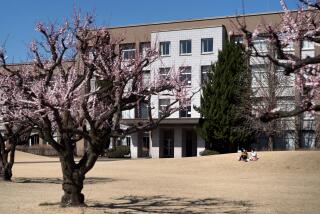Americans at Japanese Firms Lacking Power, Study Finds : Workplace: U.S. executives complain that they’re excluded from the decision-making ‘loop’ and have little or no chance for career advancement.
- Share via
ANN ARBOR, Mich. — American managers at Japanese corporations are excluded from planning and decision-making inside their firms and have little access to strategic information, according to a comprehensive new study released Wednesday by the University of Michigan.
The study, based on the first systematic survey of American managers at Japanese companies, also found that American managers have few opportunities for career advancement and that the Japanese invest little time or effort in career development programs for the American employees of their U.S. operations. By contrast, it indicated, career development is a virtual obsession in Japan.
“To many of my Japanese colleagues, ‘globalization’ implies placing the best people in the best jobs anywhere in the world. And to them, Japanese are the best,” one American said in an anonymous response to the survey.
Meanwhile, women and minorities suffer from widespread discrimination by Japanese companies, the study said.
“If a woman does a good job, instead of praising her, they want to know why I have put a woman in such an important position,” another American complained.
The study was directed jointly by business professors from Japan and the United States--Vladimir Pucik of the University of Michigan and Mitsuyo Hanada of the Sanno Institute of Business Administration.
Pucik believes that at least some of the fault for the failure to break into the decision-making “loop” lies squarely with the American managers. Only about 10% of the Americans surveyed have learned to speak Japanese, and many insisted that they did not think it is important to learn the language. “We think they are very mistaken,” Pucik said at the press conference at which the study was released.
He added that he believes that Japanese corporations are becoming more international in their outlook and are just now starting to upgrade the responsibilities given to their non-Japanese managers.
Within the past year, Pucik noted, Japanese companies have recruited several hundred American college students for managerial-track positions at their home offices in Tokyo. And Japanese executives told him that the students were recruited with the intent of “bringing them into the decision-making process.” So Pucik believes a knowledge of Japanese will prove essential to the Americans who seek to take advantage of such expanded opportunities.
“My feeling is that if you speak the language and have ability, you will get in the loop,” Pucik said.
In addition, Pucik and Hanada found that the Japanese firms that have been most receptive to giving their American employees the most authority and responsibility have turned in the best performances in the American market. A study of the financial results of the American subsidiaries of Japanese firms that cooperated with the researchers showed that improved profitability came from “increased input from local executives . . . in business planning and the development of products for the U.S. market.”
Yet, perhaps the most surprising finding of the study was the degree to which American managers have accepted their lack of responsibility while remaining in their jobs. Pucik said he believes that is largely because many of the Americans working for the Japanese are either older executives willing to sacrifice authority in return for security or younger, ticket-punching managers who hope to learn from the Japanese and use their experience to obtain better jobs at American corporations--opting out of the legendary loyalty that Japanese employees feel toward their companies. Indeed, younger American managers now see Japanese corporations only as resume builders--steppingstones to better jobs in American companies.
“I have a good job--but is it really a great career?” one American wondered, in responding to the survey.
“The perceived exclusion from decision-making and strategic planning, the absence of training and management development programs and the apparent lack of career opportunities discouraged even the most loyal and determined individuals from long-term commitment to the company,” Pucik and Hanada concluded in their study.
Such attitudes may have given the Japanese a skewed image of American business people, Pucik said. He noted that one Japanese executive who worked in the United States for several years was “surprised and impressed” by the high caliber of American executives he met at major U.S. corporations. “He said they were better than his Americans,” Pucik recalled.
Yet, as the Japanese expand their operations here and around the world, they must open their system to more talented Americans, said George Fifield, an executive recruiter with the Los Angeles office of Egon Zehnder International, which helped with the study.
“The Japanese may have to alter their practices or lose these younger, more ambitious people they are starting to recruit from college campuses,” Fifield said.
Hanada added that the image of American managers among Japanese executives is already starting to improve. “They are getting more aggressive Americans now, and that is changing the image,” he said.
The study was released just as several major Japanese corporations, in response to growing difficulties in the U.S. market, have been purging their American managers and replacing them with Japanese executives.
Last week, two top American officials at Mazda’s U.S. auto assembly plant resigned in the wake of labor difficulties there. Both were replaced by Japanese.
Earlier this fall, Suzuki, suffering from plunging vehicle sales, cleaned house at its U.S. sales arm; at least three top American managers were forced out and replaced by Japanese.
More to Read
Inside the business of entertainment
The Wide Shot brings you news, analysis and insights on everything from streaming wars to production — and what it all means for the future.
You may occasionally receive promotional content from the Los Angeles Times.










